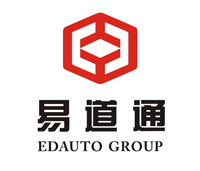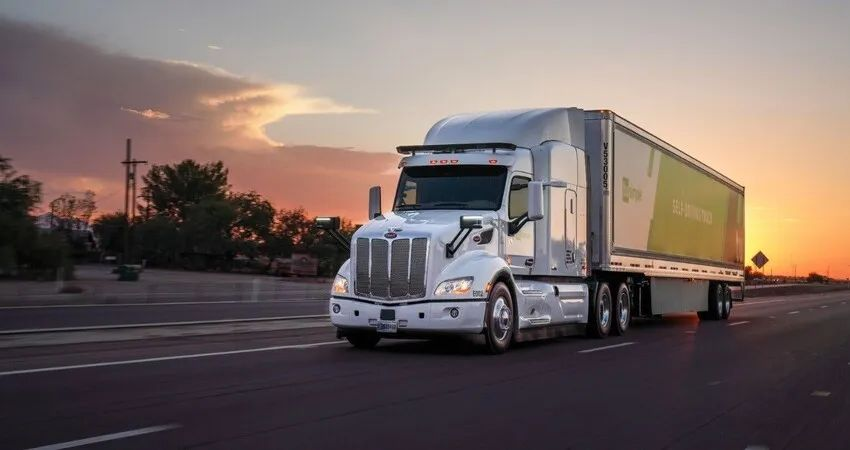
The world's first autonomous driving stock officially announced its delisting!
On January 17, local time, self-driving truck company TuSimple said in a statement that it would voluntarily delist from the Nasdaq Stock Exchange and terminate its registration with the U.S. Securities and Exchange Commission (SEC). 1,008 days after its listing, TuSimple officially announced its delisting, becoming the world's first autonomous driving company to voluntarily delist.
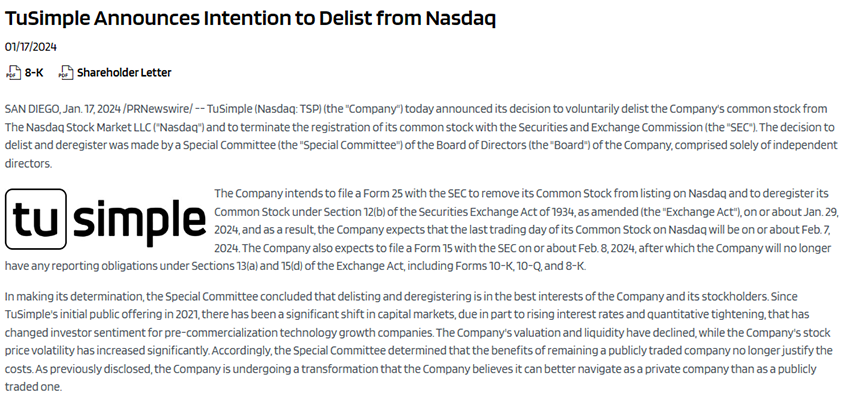
After the news was announced, TuSimple's share price plummeted by more than 50%, from 72 cents to 35 cents (approximately RMB 2.5). At the company's peak, the stock price was US$62.58 (approximately RMB 450.3), and the stock price shrank by approximately 99%.
TuSimple's market value exceeded US$12 billion (approximately RMB 85.93 billion) at its peak. As of today, the company's market value is US$87.1516 million (approximately RMB 620 million), and its market value has evaporated by more than US$11.9 billion (approximately RMB 84.93 billion).
TuSimple said, “The benefits of remaining a public company no longer justify the costs. Currently, the company is undergoing a transformation that it believes it can better navigate as a private company than as a public company. "
TuSimple is expected to deregister with the U.S. Securities and Exchange Commission on January 29, and its last trading day on Nasdaq is expected to be February 7.
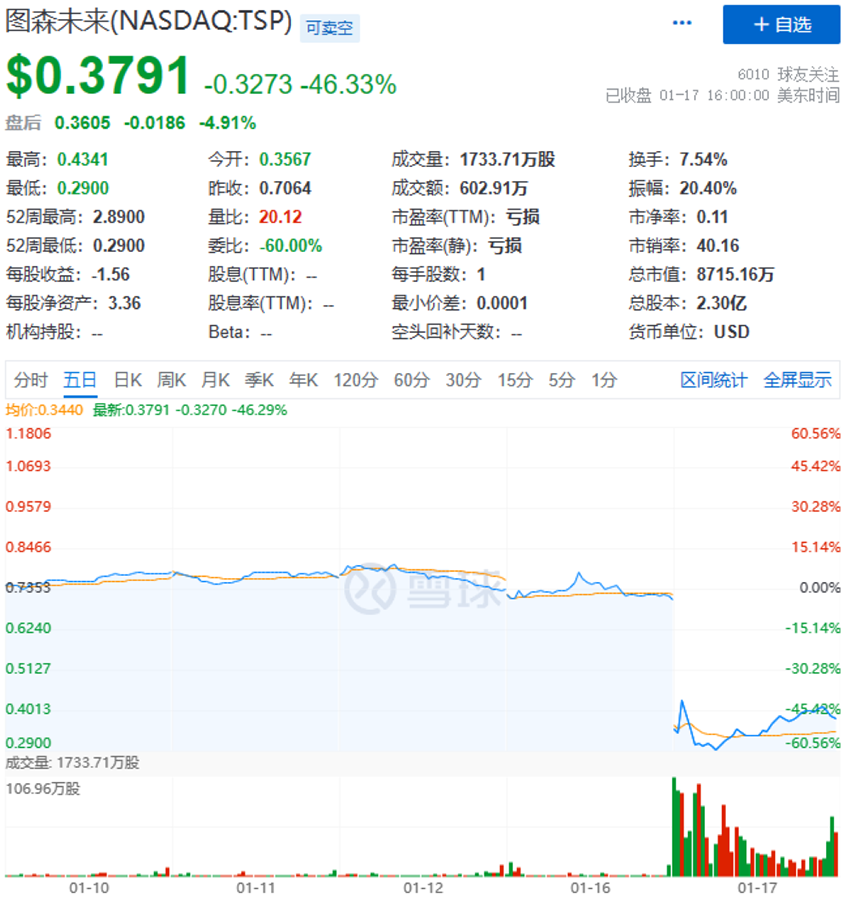
Founded in 2015, TuSimple is one of the first self-driving trucking startups on the market. On April 15, 2021, the company was listed on Nasdaq in the United States, becoming the world's first autonomous driving stock, with an initial public offering of US$1 billion (approximately RMB 71.69 billion) in the United States. However, the company has been facing setbacks since its listing. It has experienced a series of incidents such as scrutiny by U.S. regulatory agencies, management turmoil, layoffs and reorganization, and has gradually reached a trough.
Now, the company has delisted in the United States and shifted its development focus to Asia. At the same time, the company has transformed from only doing L4 to doing both L4 and L2 in parallel, and has already launched some products.
It can be said that TuSimple is actively withdrawing from the US market. As investors' investment enthusiasm subsides and the company undergoes a lot of changes, TuSimple's strategic shift may be a good thing for the company.
01.The company announced transformation and adjustment due to delisting reasons
An announcement released on TuSimple's official website shows that on the 17th local time, TuSimple decided to voluntarily delist the company's common shares from Nasdaq and terminate the registration of the company's common shares with the U.S. Securities and Exchange Commission. Decisions on delisting and deregistration are made by a special committee of the company's board of directors, composed entirely of independent directors.
TuSimple intends to file Form 25 with the U.S. Securities and Exchange Commission on or about January 29, 2024, and the last trading day of its common stock on Nasdaq is expected to be on or about February 7, 2024.
A special committee of the company's board of directors determined that delisting and deregistration were in the best interests of the company and its shareholders. Since the TuSimple IPO in 2021, capital markets have undergone significant changes due to rising interest rates and quantitative tightening, changing how investors view pre-commercial technology growth companies. The company's valuation and liquidity have declined, while the volatility of the company's share price has increased significantly.
As a result, the Special Committee believes that the benefits of continuing as a public company no longer justify its costs. As previously disclosed, the Company is undergoing a transformation that it believes it can better navigate as a private company than as a public company.
Since then, the world’s “first autonomous driving stock” has officially withdrawn from the U.S. market. TuSimple's delisting this time was due to both performance reasons and executive turmoil and transformation adjustments.
02.The once-famous high-level turmoil severely damaged our vitality.
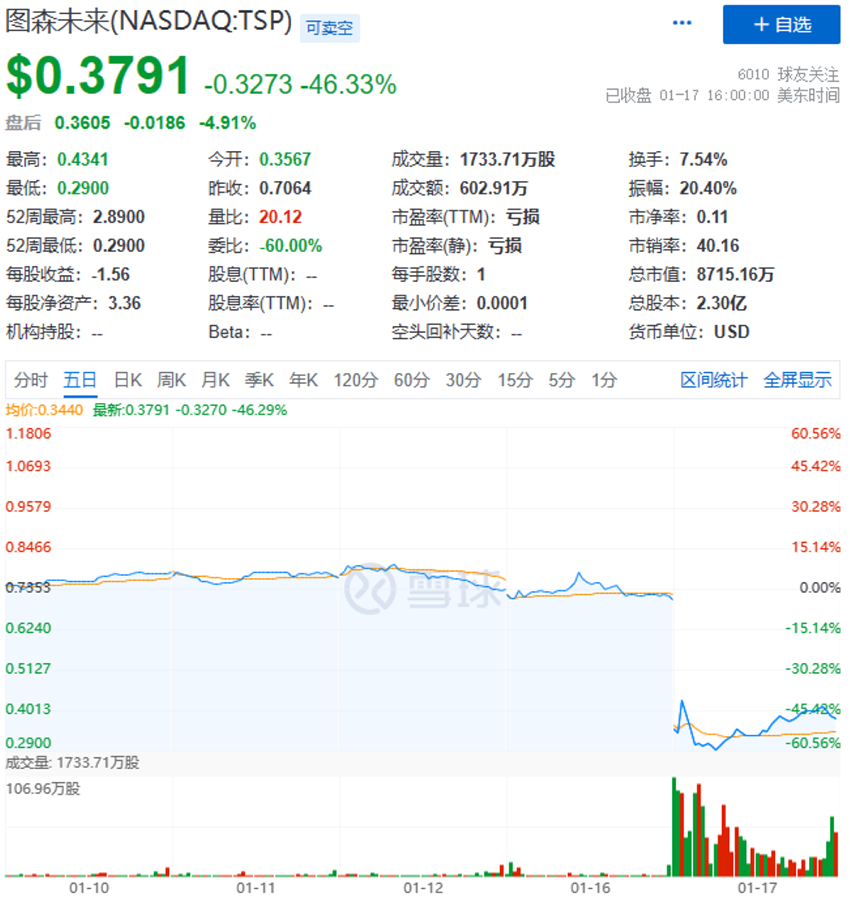
In September 2015, Chen Mo and Hou Xiaodi jointly founded TuSimple, focusing on the development of commercial L4 driverless truck solutions.
TuSimple has received investments from Sina, Nvidia, Zhiping Capital, Composite Capital, CDH Investments, UPS, Mando, etc.
In April 2021, TuSimple was listed on Nasdaq in the United States, becoming the world's "first autonomous driving stock". At that time, 33.784 million shares were issued, raising a total of US$1.35 billion (approximately RMB 9.66 billion).
At its peak, TuSimple's market value exceeded US$12 billion (approximately RMB 85.93 billion). As of today, the company's market value is less than US$100 million (approximately RMB 716 million). This means that in two years, TuSimple's market value has evaporated. More than 99%, plummeting tens of billions of dollars.
TuSimple's internal strife began in 2022. On October 31, 2022, TuSimple's board of directors announced the dismissal of Hou Xiaodi, the company's CEO, president, and CTO, and the removal of his position as chairman of the board of directors.
During this period, Ersin Yumer, TuSimple's executive vice president of operations, temporarily took over the positions of CEO and president, and the company also began to search for a new CEO candidate. In addition, Brad Buss, TuSimple's lead independent director, was appointed chairman of the board of directors.
The internal dispute is related to an ongoing investigation by the board's audit committee, which led to the board deeming a CEO replacement necessary. Previously in June 2022, Chen Mo announced the establishment of Hydron, a company dedicated to the research and development, design, manufacturing and sales of hydrogen fuel heavy trucks equipped with L4 level autonomous driving functions and hydrogenation infrastructure services, and completed two rounds of financing. , the total financing amount exceeded US$80 million (approximately RMB 573 million), and the pre-money valuation reached US$1 billion (approximately RMB 7.16 billion).
Reports indicate that the United States is investigating whether TuSimple misled investors by financing and transferring technology to Hydron. At the same time, the board of directors is also investigating the relationship between company management and Hydron.
Hou Xiaodi complained that the board of directors voted to remove him as CEO and chairman of the board of directors without reason on October 30. The procedures and conclusions were questionable. "I have been completely transparent in my professional and personal life, and I have cooperated fully with the board because I have nothing to hide. I want to be clear: I completely deny any allegation that I have engaged in malfeasance."
On November 11, 2022, TuSimple received a letter from a major shareholder announcing that former CEO Lu Cheng would return to the CEO position, and the company's co-founder Chen Mo would return as chairman.
In addition, TuSimple's board of directors has also undergone major changes. The co-founders used super voting rights to remove Brad Buss, Karen C. Francis, Michelle Sterling and Reed Werner from the board of directors, leaving only Hou Xiaodi as a director. On November 10, 2022, Hou Xiaodi appointed Chen Mo and Lu Cheng as members of the company's board of directors.
When Lu Cheng returned to the CEO position, he said: "I return to the CEO position with a sense of urgency to get our company back on track. In the past year, we have experienced turmoil, and now we need to stabilize operations and regain the trust of investors , and provide Tucson’s talented team with the support and leadership they deserve.”
Although the internal fighting subsided, it also severely damaged TuSimple's vitality.
The fierce internal battle partly led to the breakdown of TuSimple's relationship with Navistar International, its self-driving truck development partner, after a two-and-a-half-year relationship. As a result of this infighting, TuSimple was unable to work smoothly with other original equipment manufacturers (OEMs) and had to rely on Tier 1 suppliers to provide the redundant steering, braking and other critical components needed for trucks to operate autonomously. .
Half a year after the internal strife ended, Hou Xiaodi announced his resignation. In March 2023, Hou Xiaodi posted a statement on LinkedIn: "Early this morning, I officially resigned from the TuSimple board of directors, which is effective immediately. I still firmly believe in the huge potential of autonomous driving, but I think it is now my time to It was the right time to leave the company.”
At this point, TuSimple’s executive turmoil has officially ended.
03.
L4 L2 parallel business transfer to Asia-Pacific

After co-founder and company CTO Hou Xiaodi left, he revealed the reason for his departure: the management wanted Tucson to transform into L2-level intelligent driving, which was inconsistent with his own wishes.
This shows TuSimple's intention to transform and adjust its business in the future, and the company's subsequent developments have further clarified its adjustment direction.
The first is to shift the focus of business to Asia. A report submitted by TuSimple to the U.S. Securities and Exchange Commission in December 2023 showed that the company will lay off 150 employees in the United States, approximately 75% of the total number of employees in the United States and 19% of the total number of global employees. This is TuSimple’s next staff reduction following the layoffs in December 2022 and May 2023.
According to the Wall Street Journal, after the layoffs in December 2023, TuSimple will have only 30 employees in the United States. They will be responsible for the closing work of TuSimple's U.S. business, gradually sell the company's U.S. assets, and assist the company in moving to the Asia-Pacific region.
During the several layoffs in the United States, the Chinese business was not affected and instead continued to expand its recruitment.
Now that TuSimple has announced its delisting in the United States, it can be said to be a continuation of its decision to shift to the Asia-Pacific region.
The second is to take into account both L2 and L4. In terms of L2, TuSimple released the "Big Sensing Box" TS-Box in April 2023, which can be used in commercial vehicles and passenger cars and can support L2+ level intelligent driving. In terms of sensors, it also supports expanded 4D millimeter wave radar or lidar, supporting up to L4 level autonomous driving.
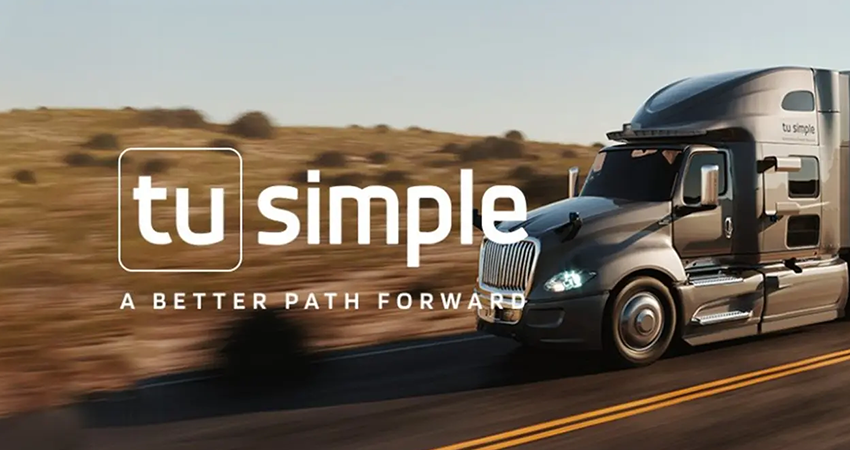
In terms of L4, TuSimple claims that it will take the route of multi-sensor fusion + pre-installed mass production vehicles, and firmly promote the commercialization of L4 autonomous trucks.
At present, Tucson has obtained the first batch of driverless road test licenses in the country, and previously started testing driverless trucks in Japan.
However, TuSimple stated in an interview in April 2023 that the TS-Box released by TuSimple has not yet found designated customers and interested buyers.
04.Conclusion: Transformation in response to market changesSince its establishment, TuSimple has been burning cash. The financial report shows that TuSimple suffered a gross loss of US$500,000 (approximately RMB 3.586 million) in the first three quarters of 2023. However, as of September 30, 2023, TuSimple still holds US$776.8 million (approximately RMB 5.56 billion) in cash, equivalents and investments.
As investors' investment enthusiasm subsides and non-profit projects gradually decline, it may be a good choice for TuSimple to actively delist in the United States, abolish departments, shift its development focus, and develop into the L2 commercial market.
Post time: Jan-26-2024
